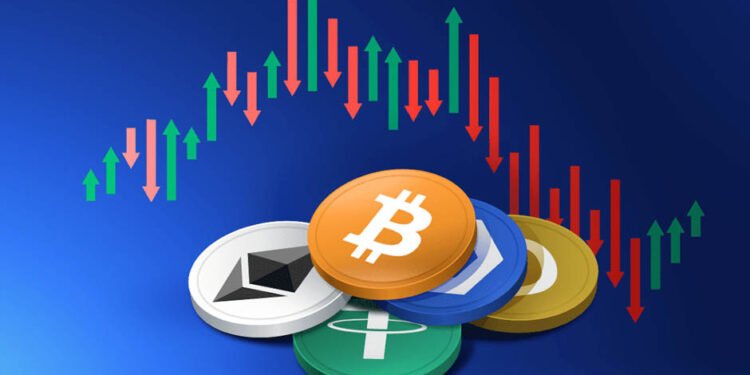In recent years, asset tokenization has emerged as a transformative force in finance, leveraging blockchain technology to reshape how assets are bought, sold, and invested in. Bitcoin, the pioneering cryptocurrency, plays a pivotal role in this evolving landscape. This article delves into the world of asset tokenization, with a focus on Bitcoin’s influence and its contribution to the persistence of this groundbreaking financial innovation. As we delve deeper into the realm of asset tokenization and its relationship with Bitcoin, platforms like Immediate GPT provide practical insights, serving as a hub for online trading and a rich source of information on the topic.
What is Asset Tokenization?
Defining Asset Tokenization
Asset tokenization is the process of converting ownership or rights to an asset into digital tokens on a blockchain. These tokens can be divided, traded, and transferred easily, enabling fractional ownership and increased liquidity of traditionally illiquid assets.
Historical Perspective: The Evolution of Asset Ownership
Asset ownership has evolved over centuries, from physical certificates to digital records. Asset tokenization represents the latest stage in this evolution, using blockchain technology to enhance security, transparency, and accessibility.
The Promise of Asset Tokenization
The primary promise of asset tokenization lies in democratizing finance. It allows a broader range of investors to access assets such as real estate, art, or stocks, which were once the exclusive domain of the wealthy. This increased access can lead to greater market efficiency and reduced barriers to entry.
Key Benefits and Challenges
Asset tokenization offers numerous advantages, including increased liquidity, reduced transaction costs, and enhanced transparency. However, it also faces challenges related to regulatory compliance, security, and market adoption.
Bitcoin’s Influence on Asset Tokenization
Bitcoin as the Pioneer of Digital Assets
Bitcoin, introduced in 2009, was the world’s first cryptocurrency and digital asset. Its success demonstrated the potential for digital assets to gain widespread adoption and inspired the creation of subsequent digital tokens.
Trust and Security: Bitcoin’s Contribution
Bitcoin’s blockchain technology introduced the concept of a decentralized ledger, which has been adopted by asset tokenization projects to ensure trust and security in transactions. The immutability of blockchain records adds an extra layer of security to asset ownership.
Liquidity and Accessibility: Lessons from Bitcoin
Bitcoin’s divisibility and global accessibility set a precedent for asset tokenization. It showcased the benefits of fractional ownership and the ability to trade digital assets 24/7 on a global scale.
Regulatory Implications
Bitcoin’s regulatory journey has paved the way for discussions surrounding the legal framework for digital assets. Asset tokenization projects are navigating these regulatory waters, benefiting from the lessons learned through Bitcoin’s history.
Types of Tokenizable Assets
Real Estate Tokenization
Tokenizing real estate enables investors to own fractions of properties, lowering the barriers to entry for real estate investments and increasing liquidity in the real estate market.
Tokenizing Art and Collectibles
Art and collectible assets are historically illiquid, but tokenization can make them more accessible to a wider range of investors and art enthusiasts.
Tokenizing Stocks and Equities
Tokenizing stocks and equities can streamline the trading process, reduce settlement times, and enable fractional ownership of major companies’ shares.
Tokenizing Commodities and Resources
Commodities like precious metals or agricultural products can also benefit from tokenization, making it easier for investors to gain exposure to these markets.
Other Innovative Asset Classes
Beyond traditional assets, tokenization has the potential to revolutionize ownership and investment in various other asset classes, such as intellectual property, patents, and more.
The Tokenization Process
Steps Involved in Asset Tokenization
Asset tokenization involves a series of steps, including asset selection, legal structuring, token creation, and market launch. Each step requires careful planning and consideration.
Smart Contracts and Blockchain Technology
Smart contracts, self-executing code on the blockchain, play a crucial role in automating and enforcing the terms of tokenized assets, reducing the need for intermediaries.
Compliance and Legal Considerations
Navigating the legal landscape is critical for asset tokenization projects. Compliance with securities laws and regulations is essential to ensure a project’s legitimacy.
Challenges in Tokenizing Different Asset Types
Different asset classes come with unique challenges, such as regulatory hurdles for securities or the need for proper custodianship in the case of physical assets.
Case Studies: Successful Asset Tokenization Projects
Lessons Learned from Notable Projects
Analyzing the successes and failures of asset tokenization projects can provide valuable insights for future endeavors in this field.
ROI and Investor Perspectives
Investors in tokenized assets may experience different levels of returns and risk exposure compared to traditional investments. Understanding these dynamics is crucial for making informed investment decisions.
The Future of Asset Tokenization
Trends and Innovations on the Horizon
The asset tokenization space is dynamic, with ongoing developments in technology and regulatory frameworks. Exploring emerging trends can help investors and stakeholders stay ahead.
Potential Impact on Traditional Financial Markets
Asset tokenization has the potential to disrupt traditional financial markets, altering how assets are bought, sold, and traded across various industries.
Risks and Regulatory Developments
As the asset tokenization landscape evolves, so do the associated risks and regulatory considerations. Staying informed about these changes is vital for all participants.
The Role of Bitcoin in Shaping the Future
Bitcoin’s continued success and adoption can inspire further innovation in asset tokenization and influence its trajectory in the years to come.
Conclusion
Recap of Key Takeaways
Asset tokenization is a transformative financial trend that leverages blockchain technology to increase liquidity and access to traditionally illiquid assets.
Encouraging Persistence in Asset Tokenization
Despite challenges, asset tokenization has the potential to democratize finance and reshape the way we invest and access assets.
Final Thoughts on the Intersection of Bitcoin and Asset Tokenization
Bitcoin’s pioneering role in the digital asset space serves as a testament to the persistence and innovation required to drive meaningful change in the financial industry. Understanding the synergy between Bitcoin and asset tokenization is crucial for navigating this evolving landscape.












